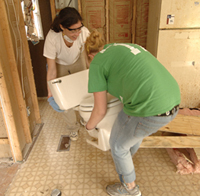Well-intentioned Students Seek Adventurous Chaperones
Alternative Spring Break promises everything except sleep

When Megan Penyack was an undergraduate at Brandeis University, she never went on traditional college spring break vacations to Florida or Mexico. In fact, she never went anywhere. This spring, for the second year, Penyack (SED’08) plans to make up for all those spring breaks she stayed home, but you won’t find her getting wild on some beach in Cancun. Instead, she’s heading to Dupree, S.D., home of — well, not much.
According to data from the 2000 U.S. census, only 434 people live in Dupree, and more than half live below the poverty line. The town is one of 23 destinations for Boston University’s Alternative Spring Break (ASB) program.
Each year, hundreds of BU student volunteers travel across the United States to perform community service work in impoverished and disaster-ridden communities. The program aims “to provide students with unique and memorable service opportunities as a substitute to the conventional spring break,” says Steve Reilly (CAS’07), comanager of ASB. Since it was founded by the BU Community Service Center (CSC) 21 years ago, ASB has expanded to accommodate nearly 300 students annually.
As an ASB chaperone, Penyack, an academic coordinator at the School of Public Health, is gearing up for a week of physically strenuous labor on the Cheyenne River Sioux Reservation, a week that includes a 60-hour round-trip van ride with 12 BU students. “We’re going to be volunteering at the reservation’s YMCA — maintaining the facility and tutoring the children,” Penyack says. “I’m extremely excited. I’ve never been to South Dakota or to a Native American reservation.”
This will be Penyack’s second year as an ASB chaperone. In 2006, she traveled to Mobile, Ala., and volunteered with the Mobile AIDS Support Service. Now called South Alabama Cares, the organization provides medical and social service support, as well as educational services, for those affected by HIV/AIDS. During their stay, Penyack and 12 students cleared debris from yards, tilled farmland, and painted houses. Additionally, they volunteered at a homeless shelter called 15 Place, where they prepared and served meals.
“Working directly with the clients really put things into perspective for us,” Penyack says. “We worked with one woman who was a single mother. She was HIV-positive and she had a son who was autistic and a daughter who was addicted to drugs. It meant a lot that we were able to help her out.”
According to a 2006 USA Today report, the percentage of universities offering ASB volunteer opportunities has increased from 66 percent to 77 percent since 2000. BU’s ASB program is one of the largest in the nation, says Marianne McPhee (COM’08), who comanages the program with Reilly. This year, the CSC is offering 23 ASB destinations throughout the Southeast and the Midwest, three of them camping trips.
“Student demand has skyrocketed,” Reilly says. “Last year we had to turn about 100 students away.”
“Registration is on a first-come, first-served basis,” McPhee adds, “and last year kids started lining up at 10 p.m. the night before to sign up.”
Although there are always more than enough students wanting to participate in ASB, Reilly says, the CSC struggles to fill all the chaperone positions. Thus far, only 10 chaperone slots for the 2007 ASB have been filled. “I think the long van ride intimidates a lot of people,” says Reilly, who has participated in the program for two years. “But the van ride is one of the best things about ASB. If you took it away, you would eliminate most of the bonding.”
Prospective chaperones might also be under the misconception that they have to organize the trip, McPhee says. But that’s not the case. “Each trip has one chaperone and two student coordinators,” she says. “And the student coordinators are the ones who plan the trip and meals and who make all of the contacts. They work out all of the details.”
ASB chaperones must be Boston University employees. Chaperones handle all monetary transfers for group expenses, including gas, tolls, and groceries. Additionally, chaperones must take charge in any emergency situation and enforce the “zero tolerance/substance-free” nature of the trip. Chaperones travel free of charge. For more information on becoming an ASB chaperone or to download an application, click here.
To read BU Today reporter Jessica Ullian’s five-day diary as a 2006 ASB chaperone, click here.